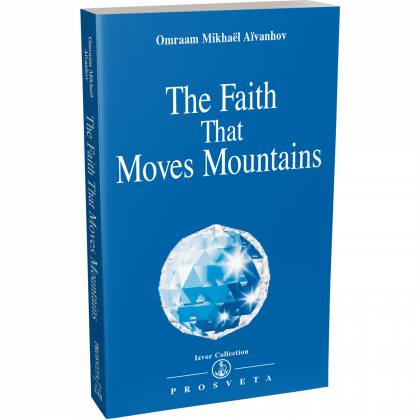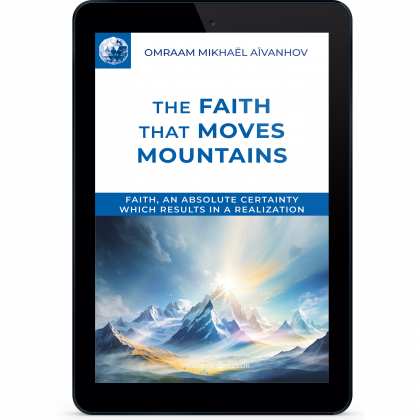Faith and knowledge
It is time for humans to attach themselves to the true reality which is the spirit
'It is time human beings abandoned the old philosophies of unreality which keep them mired in the swamps of beliefs and illusions, and attached themselves to true reality: the spirit.
In spite of the lengthy studies and hard work involved, it is easy to deal with things we can see, hear, touch, taste and feel with our physical senses. To see, hear, taste, feel and touch things on the spiritual plane is much more difficult. And it is because human beings experience their inner world as a void into which they are afraid to venture that they cling to external objects and achievements. But fear is not going to get them anywhere. They must start by studying, learning the laws, and training themselves, and then they can leap into that ‘void’, confident that they will neither lose their way nor fall. For, in point of fact, the void does not exist.
It is the inner world which has not yet been explored that people think of as a void, but gradually, as one explores it, it is in that void that fulfilment is to be found. The only void that is a real danger to human beings is that into which they will inevitably fall if they believe that salvation is to be found in matter. Faith puts us in touch with an unknown, infinitely great universe. St Paul also says that faith is the conviction of things not seen. It gives us access to this world in which we can begin to breathe, to be nourished and strengthened. Little by little, realms hitherto unknown become familiar to us... we know. This is why we should never set faith up against reason; the two go together. Faith opens a path to new knowledge. One could say that faith is infinity, and in that infinity knowledge sets apart a very restricted area for itself. It is faith that sounds the depths of infinity, that explores it, that links us to it and allows us to penetrate ever further into its depths. In this way our knowledge of the divine world grows and is enhanced thanks to our faith.
Faith always precedes knowledge; it is faith that enables us to advance. In order to know, we first have to believe, and once we know, we no longer believe, and our faith carries us forward toward something we do not yet know. When we know we no longer need to believe; we have gone beyond it. And this is how, little by little, we achieve perfect knowledge.
Faith precedes knowledge, then, and as we progressively acquire more knowledge, it strengthens the foundations of our faith. Only a faith based on true knowledge remains unshakable and enables us to continue to advance.'
'It is time human beings abandoned the old philosophies of unreality which keep them mired in the swamps of beliefs and illusions, and attached themselves to true reality: the spirit.
In spite of the lengthy studies and hard work involved, it is easy to deal with things we can see, hear, touch, taste and feel with our physical senses. To see, hear, taste, feel and touch things on the spiritual plane is much more difficult. And it is because human beings experience their inner world as a void into which they are afraid to venture that they cling to external objects and achievements. But fear is not going to get them anywhere. They must start by studying, learning the laws, and training themselves, and then they can leap into that ‘void’, confident that they will neither lose their way nor fall. For, in point of fact, the void does not exist.
It is the inner world which has not yet been explored that people think of as a void, but gradually, as one explores it, it is in that void that fulfilment is to be found. The only void that is a real danger to human beings is that into which they will inevitably fall if they believe that salvation is to be found in matter. Faith puts us in touch with an unknown, infinitely great universe. St Paul also says that faith is the conviction of things not seen. It gives us access to this world in which we can begin to breathe, to be nourished and strengthened. Little by little, realms hitherto unknown become familiar to us... we know. This is why we should never set faith up against reason; the two go together. Faith opens a path to new knowledge. One could say that faith is infinity, and in that infinity knowledge sets apart a very restricted area for itself. It is faith that sounds the depths of infinity, that explores it, that links us to it and allows us to penetrate ever further into its depths. In this way our knowledge of the divine world grows and is enhanced thanks to our faith.
Faith always precedes knowledge; it is faith that enables us to advance. In order to know, we first have to believe, and once we know, we no longer believe, and our faith carries us forward toward something we do not yet know. When we know we no longer need to believe; we have gone beyond it. And this is how, little by little, we achieve perfect knowledge.
Faith precedes knowledge, then, and as we progressively acquire more knowledge, it strengthens the foundations of our faith. Only a faith based on true knowledge remains unshakable and enables us to continue to advance.'
Text taken from the book "The Faith That Moves Mountains", chap. 5 "Faith always precedes knowledge".




